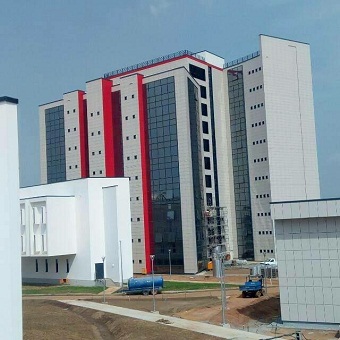The acting chairman of EFCC, Ibrahim Magu, has defended the agency’s N24 billion new office, claiming it is a modest amount for a building that should cost N100 billion.
The 10-floor building is about 95% completed as at May 9 and is expected to serve as the operating base for the anti-graft body.
Anti-corruption campaigners and other citizens are keeping their eyes on the cost, especially coming at a time that the agency itself is complaining of poor funding that hampers its basic operations.

“You are not being fair,” Mr. Magu said when asked by PREMIUM TIMES to respond to the controversies around the price. “If you go and bring any valuer, they will value it for not less than N100 billion.”
The agency has been renting offices and official quarters for most of its staff at its branches across the country.
On November 24, 2010, Yayale Ahmed, then Secretary to the Government of the Federation, proposed the new building to the Federal Executive Council and later got an initial release of N18 billion for it. .
A few weeks later, Sahara Reporters published concerns about how Julius Berger won a ‘no objection’ procurement certificate to build the office, alongside a slew of other allegedly questionable contracts award by President Jonathan’s cabinet at the time.
The new office includes a mid-size parking facility, three detached buildings, including a clinic, a generator house, and a 33KV step-down transformer station.
Martin Obono, an Abuja-based anti-corruption campaigner, said the EFCC has no justification for spending N24bn on a single office at the expense of the taxpayers.
Mr. Obono said ;
“It is not feasible that N24bn would have been spent on that building, It is too expensive for a so-called anti-corruption agency.”
Mr. Obono added the EFCC could build a befitting office for its operations in each of the 36 states at the price of N24 billion. .
Several Abuja-based staff members will still continue in rented apartments because the new building still cannot accommodate everyone.














